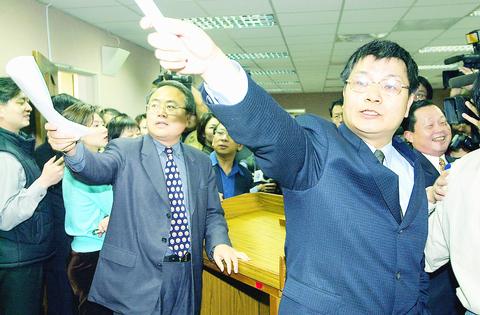Since the disclosure of secret National Security Bureau (NSB) accounts two weeks ago, legislative bickering between "pan greens" and "pan blues" has dominated the chamber, sidelining issues of vital importance, analysts said yesterday
Scheduled to listen to reports on last year's classified NSB budget, the Budget and Final Accounts Committee meeting was paralyzed by squabbling between ruling and opposition parties over whether the head of the NSB should be questioned.
After leaks to the media about the secret accounts and the alleged misuse of NSB funds, the budget committee changed its agenda last week and resolved to invite Presidential Secretary-General Chen Shih-meng (

PHOTO: GEORGE TSORNG, TAIPEI TIMES
Before the meeting commenced, the atmosphere became tense after lawmakers learned that Chen and Chiou had failed to show.
After it turned out that only Lin Chuan and NSB Deputy Director Huang Lai (
The brouhaha in the meeting sidelined reports prepared by the Control Yuan's auditors, in which the ministry admitted that, at the present time, it has little practical or legal right to review the NSB's budget and hence, has not done so.
This is because the NSB's budget, also known as the "Ding Yuan (定遠) project," is part of the Ministry of National Defense budget, the contents of which are classified.
According to Control Yuan sources, a deal has been reached with the defense ministry concerning the review of the NSB's budget -- but such a review could only take place when the budget was declassified. But since there have been no related regulations governing the budget's declassification, Control Yuan auditors remain unable to do so.
The report suggests that in the future, the Cabinet should clearly divide budget items into "public" and "classified" sections when preparing intelligence budgets.
"Necessary measures should include regulations for listing the different degrees of classified documents and a fixed number of years in which to disclose them," the report said.
"The government must also enhance internal controls for all intelligence institutions."
The report therefore stresses that the legislature should also formulate related laws or acts to protect the confidential information of the country and build up a proper mechanism for supervision.
"There is no appropriate law or regulation to introduce standard procedures for us to supervise classified NSB budgets," an official of the audit ministry said privately.
"Only when the Legislative Yuan passes a law to regulate the timing of classified subjects of the intelligence system can we prevent corruption or another scandal like the recent NSB scandal."

Taipei has once again made it to the top 100 in Oxford Economics’ Global Cities Index 2025 report, moving up five places from last year to 60. The annual index, which was published last month, evaluated 1,000 of the most populated metropolises based on five indices — economics, human capital, quality of life, environment and governance. New York maintained its top spot this year, placing first in the economics index thanks to the strength of its vibrant financial industry and economic stability. Taipei ranked 263rd in economics, 44th in human capital, 15th in quality of life, 284th for environment and 75th in governance,

The Sports Administration yesterday demanded an apology from the national table tennis association for barring 17-year-old Yeh Yi-tian (葉伊恬) from competing in the upcoming World Table Tennis (WTT) United States Smash tournament in Las Vegas this July. The sports agency said in a statement that the Chinese Taipei Table Tennis Association (CTTTA) must explain to the public why it withdrew Yeh from the WTT tournament in Las Vegas. The sports agency said it contacted the association to express its disapproval of the decision-making process after receiving a complaint from Yeh’s coach, Chuang

Control Yuan Secretary-General Lee Chun-yi (李俊俋) tendered his resignation last night, admitting that he had misused a government vehicle, as reported by media. His resignation was immediately accepted by the Control Yuan. In a statement explaining why he had resigned, Lee apologized for using a Control Yuan vehicle to transport his dog to a pet grooming salon on May 20. The issue first came to light late last month, when TVBS News reported that Lee had instructed his driver to take the dog to the salon. The news channel broadcast photos that it said were taken by an unnamed whistle-blower, which purportedly showed the

A former officer in China’s People’s Liberation Army (PLA) who witnessed the aftermath of the 1989 Tiananmen Square massacre has warned that Taiwan could face a similar fate if China attempts to unify the country by force. Li Xiaoming (李曉明), who was deployed to Beijing as a junior officer during the crackdown, said Taiwanese people should study the massacre carefully, because it offers a glimpse of what Beijing is willing to do to suppress dissent. “What happened in Tiananmen Square could happen in Taiwan too,” Li told CNA in a May 22 interview, ahead of the massacre’s 36th anniversary. “If Taiwanese students or